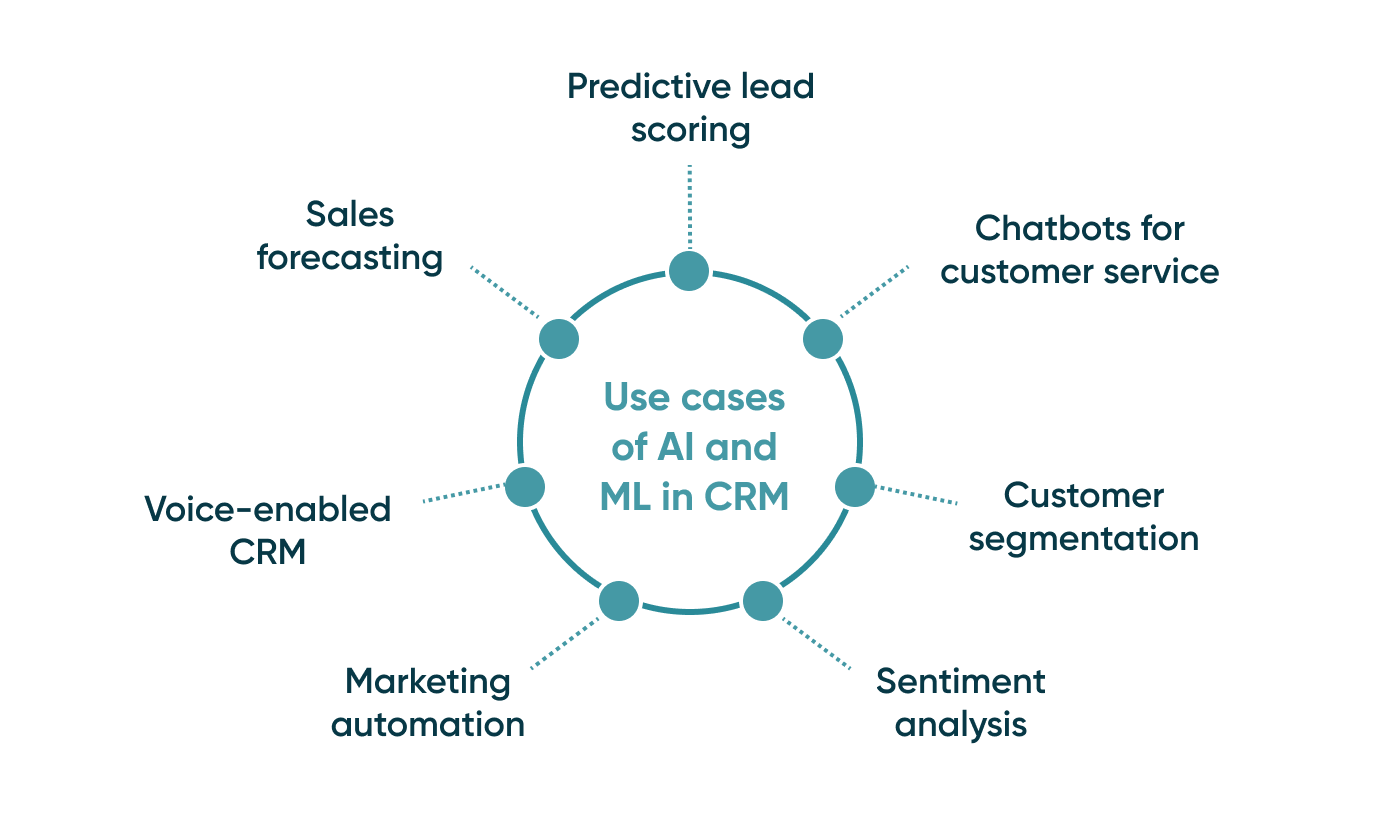
However, due to the growing competition in the current business world the only way that an organization can be able to stand competition is through adopting or perhaps, using specific it tools to enhance customer relations. This is where AI CRM software comes into the picture that is revolutionalising the way businesses engage customers. The customer relationship management software market is, in fact, the largest and growing the fastest, with the market estimate at $131. 90 billion by 2028. Other statistic source also indicates that the global CRM market is expected to grow up to 113. 22 billion by 2027.
As far as customers’ service is considered, CRM plays a significant role. A recent research also reveled that the firms that have implemented CRM solutions recorded customer retention up to 16%, conversion ratio up to 17%, and sales force effectiveness up to 21%. Continuing the argument, one gets to know that, especially for the financial services: 53% SF customers are ready to switch a provider due to the quality of the digital touchpoint and 39% of the same customers due to the quality of the customer touchpoint as specified in the latest Salesforce report.
This ultimate guide is devoted to intelligent AI solutions in CRM systems, advantages, applications, and how they are going to revolutionize the outlooks on customer-focused business evolution.
What is AI CRM Software?
AI CRM can also be referred to as an automated customer relationship management system that heavily uses artificial intelligence and machine learning to operationalize several processes, estimate customer behavior patterns, and deliver insights. These intelligent systems include additional smart options that are beyond the standard CRM functions that can significantly enhance the interaction with the customers, the efficiency of sales, and the effectiveness of the business itself.
| Feature | Description |
| Predictive Analytics | Forecasting customer behavior and sales trends |
| Automated Lead Scoring | Identifying and prioritizing high-potential leads |
| Intelligent Chatbots | Providing 24/7 customer support and gathering valuable data |
| Natural Language Processing | Understanding and responding to customer queries |
| Sentiment Analysis | Gauging customer emotions and satisfaction levels |
| Sales Forecasting | Predicting future sales performance with greater accuracy |
| Personalized Recommendations | Offering tailored product suggestions |
| Automated Data Entry | Reducing manual data input and errors |
How AI CRM Software Works
AI CRM systems leverage advanced algorithms and machine learning models to analyze vast amounts of customer data, including:
- Demographic information
- Purchase history
- Website interactions
- Email engagement
- Social media activity
- Customer service interactions
By processing this data, AI CRM software can:
- Identify patterns and trends in customer behavior
- Predict future customer actions and needs
- Automate routine tasks and workflows
- Provide personalized recommendations for sales and marketing strategies
- Offer real-time insights to guide decision-making
Advantages of using AI CRM Software
Implementing AI-powered CRM solutions offers numerous advantages for businesses:Implementing AI-powered CRM solutions offers numerous advantages for businesses:
- Improvement of Customer Knowledge AI CRM solutions offer a richer and better understanding of customers, including their preferences and actions, so the business can communicate and sell more suitably.
- Better lead management, given that AI CRM technology sorts through potential customers to make the best leads to target apparent to managers of sales, making the conversion rates higher.
- AI helps firms to develop highly individualized client experiences, thus creating value across the customer journeys.
- Higher productivity The processes routine processes and entry of data allow sales and customer service departments to attend to more important matters.
- Increased Sales Forecasting Sale forecaster models can be more accurate analyzing past sales data and tendencies for better resource management and planning.
- Preventive Customer Relations Chatbots as well as propensity clusters enable organisations provide the customer relation solutions ahead of time, and enhance the relation satisfaction level.
- Real-time processing and business intelligence permit companies to make relevant decisions because they have updated and accurate information.
- Scalability Since AI CRM systems can process big data and can expand as the business expands, scalability is another advantage.
Where Can AI CRM Software Be Used?
- AI CRM software has wide-ranging applications across various industries and business functions:AI CRM software has wide-ranging applications across various industries and business functions:
- Sales: Salesforce automation has mainly been applied in the enhancement of the sales functions, ranging from lead generation to sales closure.
- Marketing: Interacting with the audience in a closer manner and enhancing the concepts of marketing communication activities.
- Customer Service: Adding more value and effectiveness to responses and routing of the support systems.
- E-commerce: Offering customised services that are aimed at helping the client find what he/she wants.
- Healthcare: Maintenance of patients relation and integration of care delivery
- Financial Services: Improving the risk appraisal and giving individual solicitation.
- Retail: Improvement of stock control and making specific promotions
- Telecommunications: Looking at minimising churn and enhancing the approaches to retaining the customers
- Travel and Hospitality: Individualization of travel advice and improvement of services to the guests
- Real Estate: Selecting the suitable buyers and making the forecasts about the tendencies of demand
Best Practices for Implementing AI CRM Software
To maximize the benefits of AI CRM systems, consider these best practices:To maximize the benefits of AI CRM systems, consider these best practices:
- Set Specific Accomplishment Goals Specify concrete targets of using AI CRM with regard to the corporate strategic development goals established.
- A few of the things to consider: Keep the data clean Always collect, update, and store relevant customer data that can help the AI systems give proper results.
- Training Implementation Make sure that people understand that has many components and are prepared to train the staff to fully utilize its tools.
- Pilot It Before Going Big Implement the sustainability measures in small, manageable projects to prove their worth to the organisation.
- Ensure Protection of Data Use strong measures to protect the data and conform to data protection laws.
- Easy Integration They will be able to seamlessly integrate to your existing business systems to form intricate and efficient system.
- Maintain Constant Supervision and Modification Carry out a report of system performances on regular basis and ensure changes are made on the acquired data.
- Adopt the culture of innovation Ensure that your company encourages the use of technology and development improvement.
Challenges in AI CRM Implementation
While AI CRM software offers significant benefits, businesses may face challenges during implementation:While AI CRM software offers significant benefits, businesses may face challenges during implementation:
- Data Integration and Quality Collection of data from different sources and maintaining data consistency are some of the issues that may be experienced.
- Perceived Use Encouraging the team members to properly use the new system and integrate it into their practice can be difficult.
- Ethical Implications Addressing issues of AI-based analytics along with ethical issues and personas of the customer.
- Non-standardization and variability Incorporating elements that are unique to certain businesses into the AI CRM system, but at the same time preserve the general functionality.
- Managing AI-based insights Training employees to understand the AI generated suggestions and applying them.
Future Trends in AI CRM Software
As technology continues to evolve, several trends are shaping the future of AI CRM systems:As technology continues to evolve, several trends are shaping the future of AI CRM systems:
- Enhanced capabilities in the interpretation and processing of raw language data Reduced response time to customers’ queries through the processing of complex sentence structures in different languages.
- Customer Sentiment Analysis Enhancing the use of emotion AI to address the customers’ emotions or feeling about the products and services.
- Augmented Reality Utilization with the application of AR for better and rich product demonstrations and improved customer support system.
- Voice-Recognizing Always-On CRM The integration of voice support to CRM; better experience and convenience to users.
- Application of Blockchain Innovations to Improving Data Protection and CRM Systems’ Transparency Exploring blockchain technology as a solution for improving data security in CRM systems.
Conclusion
The advances in the technology of AI CRM has led the businesses to have the ability to manage customers as never before, through an influential tool of customer relationship management software. As compared to their earlier counterparts, these superior systems with artificial intelligence and machine learning allow them to gather more information, perform many contextual and repetitive activities with efficiency, and set them up to deliver better and more customized solutions from the customer’s point of view.
With the changing trends of customer demands and the new world order driven by the Internet and sophisticated technologies, AI CRM will be a decisive factor influencing competitiveness in the market. Business organizations that adopt as well as deploy AI-enabled CRM strategies will be in a better place to strengthen customer relations, enhance organizational productivity and achieve lasting business success.
The management of customer relations will require the integration of Artificial Intelligence in the future. Through adopting the AI CRM software, the companies have a chance to go even beyond the customer’s expectations and therefore to create fixed value for the various consumers in the contemporary conditions of the highest level of competition. Thus, the constructive interdependence of humans and artificial intelligence in the future will bring about the next level of customer-oriented business strategies and create the foundation for deeper and more profitable customer relationships.





